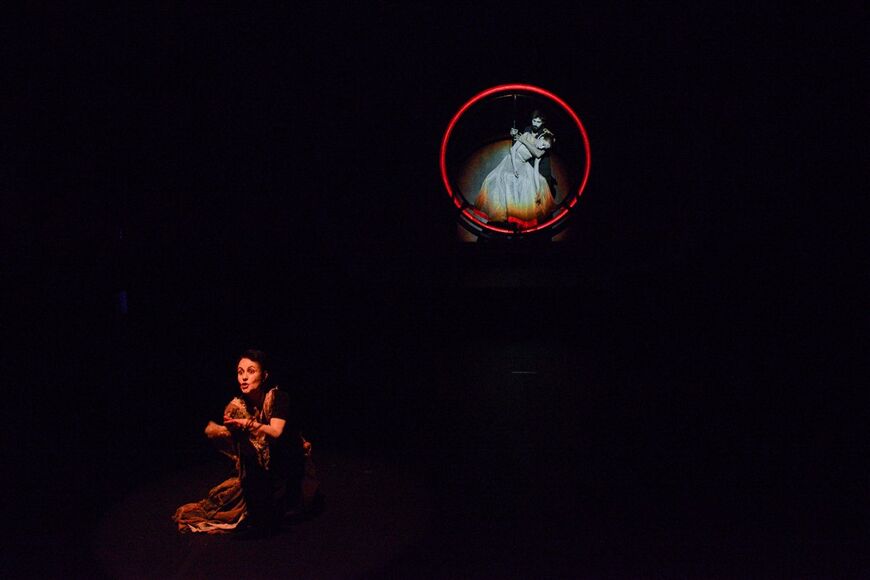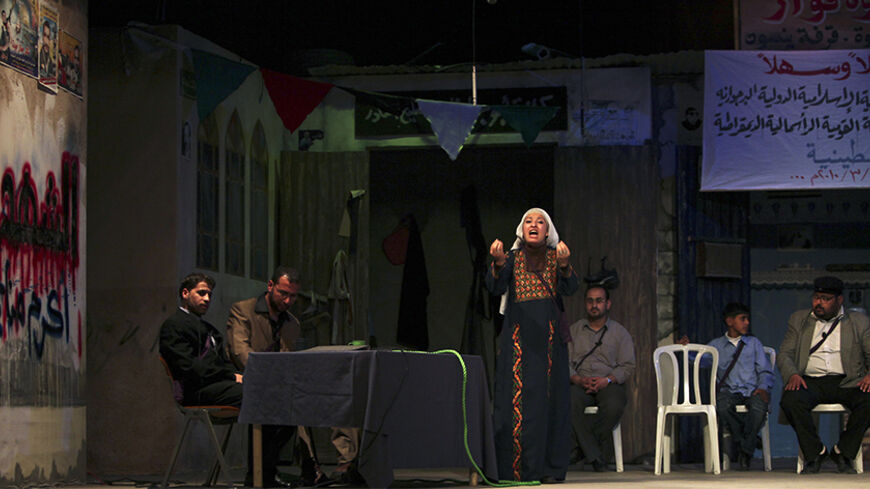Turkey’s culture war takes stage at theater awards
Turkish theater’s biggest night became a flashpoint for the country's polarized arts scene when an actress triggered outrage by praising State Theaters Director Tamer Karadagli.

Under the glittering lights of the Halic Congress Center, the 27th Yapi Kredi Afife Theater Awards unfolded on Oct. 6 like Turkey’s own Tony Awards: elegant, emotional and filled with anticipation. Then the boos and walkouts came, as the theater mirrored Turkey’s deepening cultural and political divide.
At the heart of the controversy lay actress Sukun Isitan, who took the stage to accept the Best Actress award for her role in “Medea Material,” Heiner Muller’s post-modern interpretation that shifts the Greek myth into the chaos of the early 21st century. The one-act play, a joint production of the Ankara and Istanbul State Theaters, swept the awards, winning five major categories including Best Play, Best Director, Best Actress, Best Set Design and Best Lighting. The haul made it one of the most-awarded productions in State Theater history, a triumph that should have been unifying but instead combusted.
From ovation to outrage
“I’d like to thank our general director and my dear friend, Tamer Karadagli, who knows the stage is the only place I can truly breathe, and he’s supported me every step of the way in balancing my administrative work with acting,” Isitan said as she accepted the prize.
Her words struck a nerve. Many in the audience booed and some walked out in protest of what they saw as an unearned tribute to Karadagli, the embattled director of the State Theaters after months of tension.
Anger against Karadagli, an actor known for nationalist outbursts who President Recep Tayyip Erdogan placed at the helm of State Theaters in 2023, had been building for months. In September, 12 artist-instructors at Hacettepe University’s State Conservatory were stripped of teaching permissions and contracts because they were ineligible for them while employed by the State Theaters. According to a report by the independent news site T24, their lessons were terminated after Karadagli complained to the rector that theirs were “dissident” voices. Two insider sources confirmed to Al-Monitor that the individuals affected were “critical of government policy.”
“It is a very unfair and inconsistent move,” said a State Theater member who requested anonymity for fear of dismissal.
Isitan, who made a statement to the daily Milliyet on Oct. 9, denied that the dismissals had anything to do with the State Theaters. "It was the university that decided not to renew their contract," she said.
“For the first time in its 90-year history, the conservatory began a semester without a single performing theater artist on staff,” fumed actor and academic Murat Atak, one of the whistleblowers who brought the issue into public view on his YouTube channel. He described the purge as political, “a project to sideline those who stood against the general director," adding, "The conservatory has now opened its doors to a generation of apprentices without masters.”
Criticism of Karadagli’s leadership centers on claims that he has concentrated authority once shared with artistic boards, personally approving repertoires, appointments and even tour schedules while sidelining internal councils. Several former actors say they were pressured or reassigned after voicing dissent. His own rhetoric, including a now-famous remark, “If you won’t work, resign; the tulip era is over,” has come to symbolize his command-and-control style. Public frustration has spilled into satire: Sahan Gokbakar, one of Turkey’s most popular comedians, released viral sketches parodying “Haluk,” the macho sitcom character that made Karadagli a household name, mocking him as not just an actor but an “AK-tor,” a pun combining actor and the ruling Justice and Development Party (AKP), whose favor is seen to have secured his position.
Against that backdrop, Isitan’s public thanks were taken as an implicit political gesture, particularly since she was one of the individuals who were allowed to combine acting with the coveted post of State Theaters deputy chief director, a position generally reserved for more experienced directors.
Isitan told Milliyet that a recent change in the regulations had made anyone who had been in the production of five plays eligible for the post. "No one protested when this change was made, so why are we raising the issue now?" she asked.
Politics on stage
Yet to cast this as a simple battle between a conservative government appointee and a liberal theater community might oversimplify matters. Journalist Deniz Zeyrek observed that other cultural appointments by the AKP government, for example, that of former ballet dancer Tan Sagturk, did not provoke a similarly harsh backlash. “Karadagli is serving the government, not the state,” he said on his Oct. 8 morning program.
Actor Erdal Besikcioglu, who is now the mayor of Etimesgut, expressed sorrow over the events. “I was very saddened to witness a justified uprising against the general director of my former institution,” he said in a press conference at the parliament on Oct. 8. His comments framed the conflict not just as politics, but as an existential crisis for foundational theatrical institutions.
Gulsah Deniz-Atalar, the Republican People's Party's deputy chair for culture, delivered one of the sharper partisan critiques at the same press conference. She accused the Ministry of Culture of directing support almost exclusively to the State Theaters, while independent companies “fight simply to survive.” She warned, “On one side are productions fully financed by the state; on the other are independent stages that can’t pay their electricity bills or avoid censorship. These venues are excluded not only economically, but in cultural visibility. They are rendered invisible even in major awards like Afife.”
According to official statistics, theater attendance rose by over 15% in the 2022–2023 season, reaching 6.2 million spectators nationwide after the COVID-19 pandemic. But that growth hides stark inequality: state theaters are recovering, while many independent stages struggle to stay open, lacking sponsorship and stable audiences outside major cities.
As for the award ceremony, many within theater circles insist that "Medea Material" genuinely merited its honors with its bold staging and intellectual resonance. Turkish bank Yapi Kredi, the sponsor of the Afife Awards since 1997, maintained that the awards honored legends such as stage designer Metin Deniz and director Mehmet Birkiye, chosen by a 33-member jury that watched 266 productions this year.
A scene from "Medea Material" when staged in Ankara (State Theaters File Photo)
After the uproar, jury chair Asli Yilmaz reminded the press of the original purpose of the Afife Awards, named after the first Muslim woman to appear on an Ottoman stage and who was once arrested for acting: “We know how difficult it is to produce theater in these conditions, and we see that every play on stage is a victory in itself. Our task is to honor that effort, not to divide it.”
“The jury, a good mix of thespians and academics, has done a good job in selecting the plays, and the Haldun Dormen award to Demet Evgar for playing the part of Afife Jale was very fair,” she told Al-Monitor.








